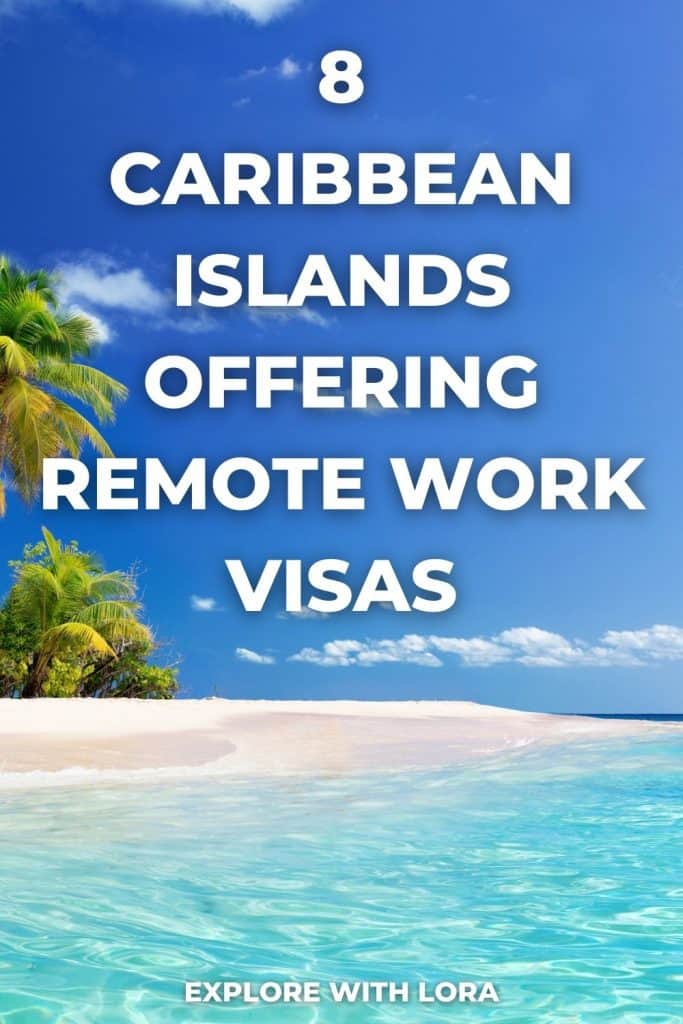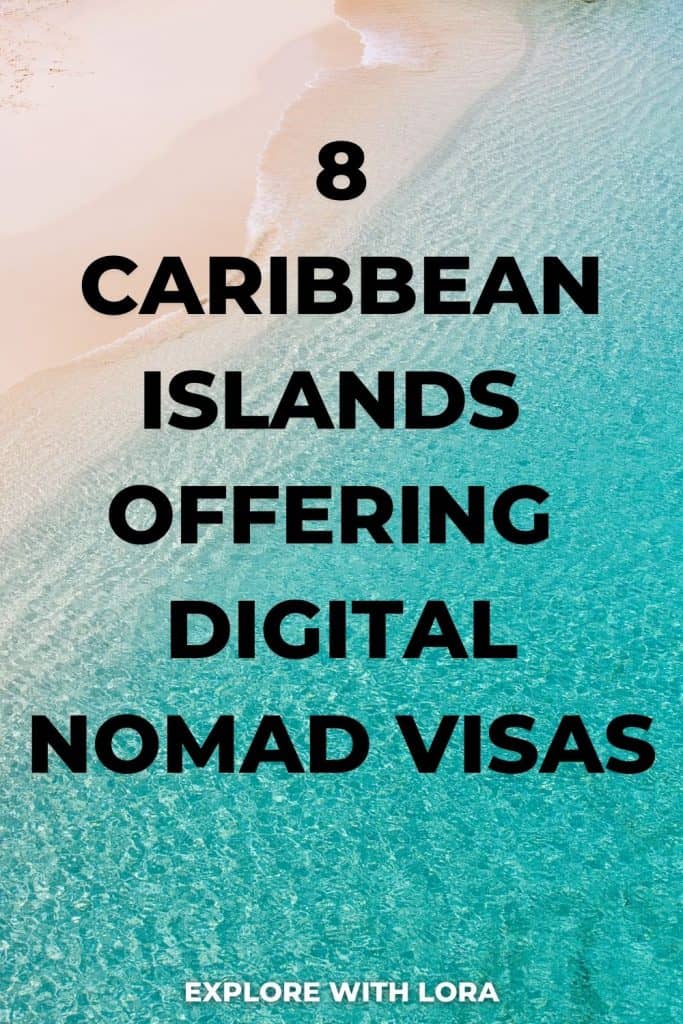This post may contain affiliate links. By clicking and making a purchase through the links, I earn a small commission at no extra cost to you. See my disclaimer for more information. This and display ads allow me to keep the site up to date and give back.
If you’re dreaming of palm trees and white-sand beaches and already working remotely then why not work from home in the Caribbean?
The global pandemic has changed how we live, work and play, with many employers now encouraging remote work. And with so many Caribbean islands offering visas for remote workers, the timing has never been better to try becoming a digital nomad.
Eight Caribbean countries are now offering digital nomad visas including Anguilla, Antigua & Barbuda, Aruba, Barbados, Bermuda, the Cayman Islands, Curacao, and Monserrat. And more islands have it on the horizon!
Many of these Caribbean islands also have low covid infection rates, offering remote workers a safe place to ride out the pandemic. I moved to the Caribbean in November to live and work remotely and it’s been one of the best decisions I’ve ever made!
What is a remote work visa?
A remote work visa is a special visa issued by a country that allows you to live there for an extended period of time above the normal tourist visa length. You usually have to be employed by a country outside of the one you are visiting, and are not permitted to work in the country while there.
Why work from home in the Caribbean?
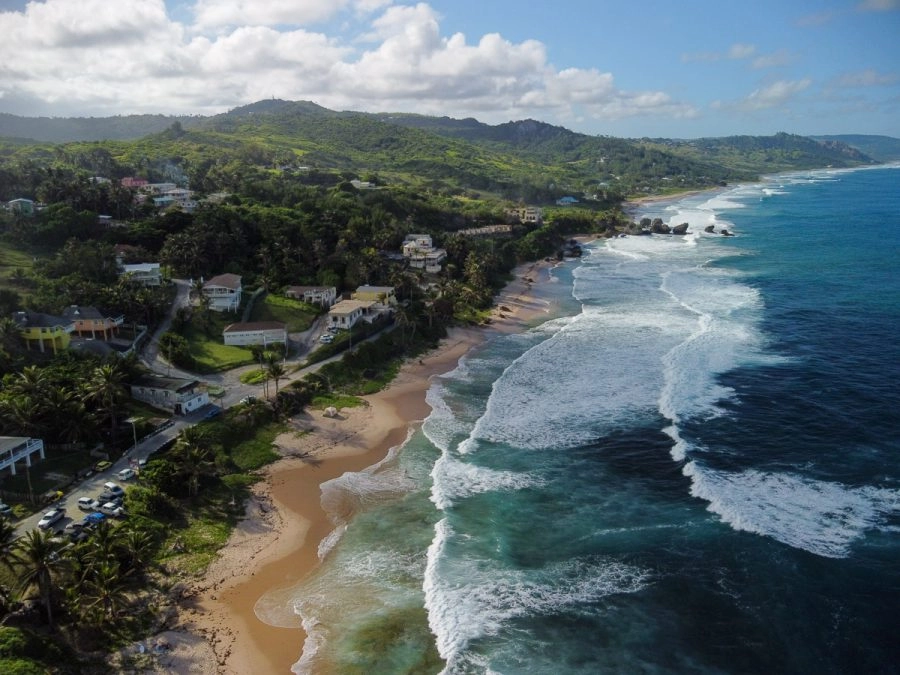
The best part about living in the Caribbean for me is the lifestyle. Being able to swim in the ocean, watch stunning sunsets from the beach, and enjoy a slow way of life has been amazing for my mental health. If you’ve always dreamt of living somewhere with warm weather and beautiful beaches, the Caribbean is a perfect choice.
The Wi-Fi works well, and it’s easy to meet other digital nomads. While it’s not the cheapest place to live in the world, I do find the cost of living lower than it was for me in Toronto.
Another benefit of living in the Caribbean is that it’s not far from North America, and there are daily direct flights to major hubs like Miami and Toronto. If you want to go home and visit your friends or family, you can relatively easily.
@explorewithlora Andddd this is why I moved to Barbados #barbadostiktok #barbados🇧🇧 #barbados246 #workfromhomelife #remoteworkinglife #digitalnomadlifestyle
♬ Shower – Becky G
Caribbean islands offering visas for remote workers
| Length of visa | Cost | Minimum Income/Year | |
| Barbados Welcome Stamp | 12 months | 2,000 Singles 3,000 Families | 50,000 |
| Antigua Nomad Digital Residence | Up to 2 years | 1,500 Singles 2,000 Couples 3,000 families. | 50,000 |
| At Home in Curacao | 6 months, with possibility to extend another 6 | 294 USD | Must be employed, no mention of min income |
| Cayman Islands Global Citizen Concierge Program | Up to 24 months | 1,469 per annum for 2 adults, 500 per additional dependent | 100,000 Singles 150,0000Couples 180,000 Families |
| Monserratt Remote Workers Program | 12 months | 500 Singles 750 Families (up to 3, additional dependent are 250). | 70,000 |
| Anguilla Remote Work Visa | 12 months | 2,000 Singles 3,000 Families (up to 4) | Employed outside of Anguilla, no mention of min income |
| Aruba work staycation | Up to 90 days | None. Just book one of the packages. | Employed in home country, no mention of min income |
| Work from Berbuda Certificate | 12 months | 263 | Employed overseas, student, or have means to support yourself. |
Barbados welcome stamp
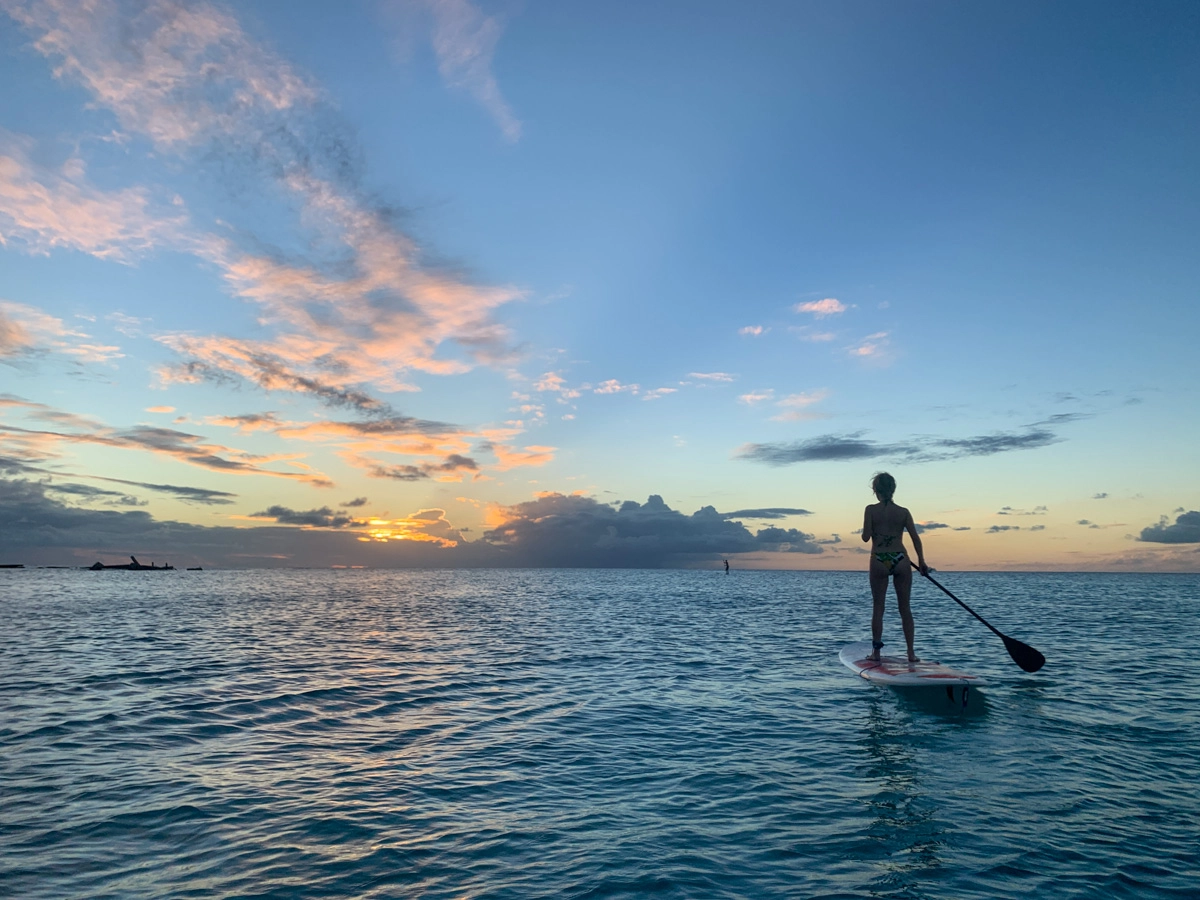
Barbados led the charge with the remote work visas in the Caribbean when they introduced the Barbados welcome stamp. It allows remote workers to live and work on the island for up to 12 months and has become one of the most popular visas for digital nomads.
I’ve been living in Barbados for the last few months and it’s been incredible. Although I came here solo it’s been very easy to make friends as there are many other digital nomads working in Barbados, and the atmosphere is social with frequent events. It’s a dream destination for surfers with some of the best waves in the Caribbean.
The lifestyle in Barbados is amazing. It’s easy to stay active whether you’re hiking, diving, surfing, snorkeling, or just swimming with sea turtles. The locals are friendly and in general, I noticed a huge improvement in my mental health immediately after moving here.
I didn’t actually get the welcome stamp as I’m not planning to be here for longer than 6 months, and Canadians/Americans get six months on a regular tourist visa (after three months you must extend at the immigration office in Bridgetown).
Application requirements: Must be employed outside of Barbados and earn a minimum of 50,000 USD, and/or have the means to support yourself.
How to apply: Apply online here. The form takes less than 10 minutes to complete, and you should hear back within a week.
Fee: 2000 USD for individuals, 3000 USD for families.
COVID-19 entry requirements: Barbados is opened for international tourism. At the time of writing, all arriving tourists must take a PCR test within 72 hours or arrival, fill out a health declaration, and take another PCR test 5 days after arrival. Until you get your second test results back, you must quarantine at an approved accommodation. Check here for the latest requirements.
Antigua Nomad Digital Residence
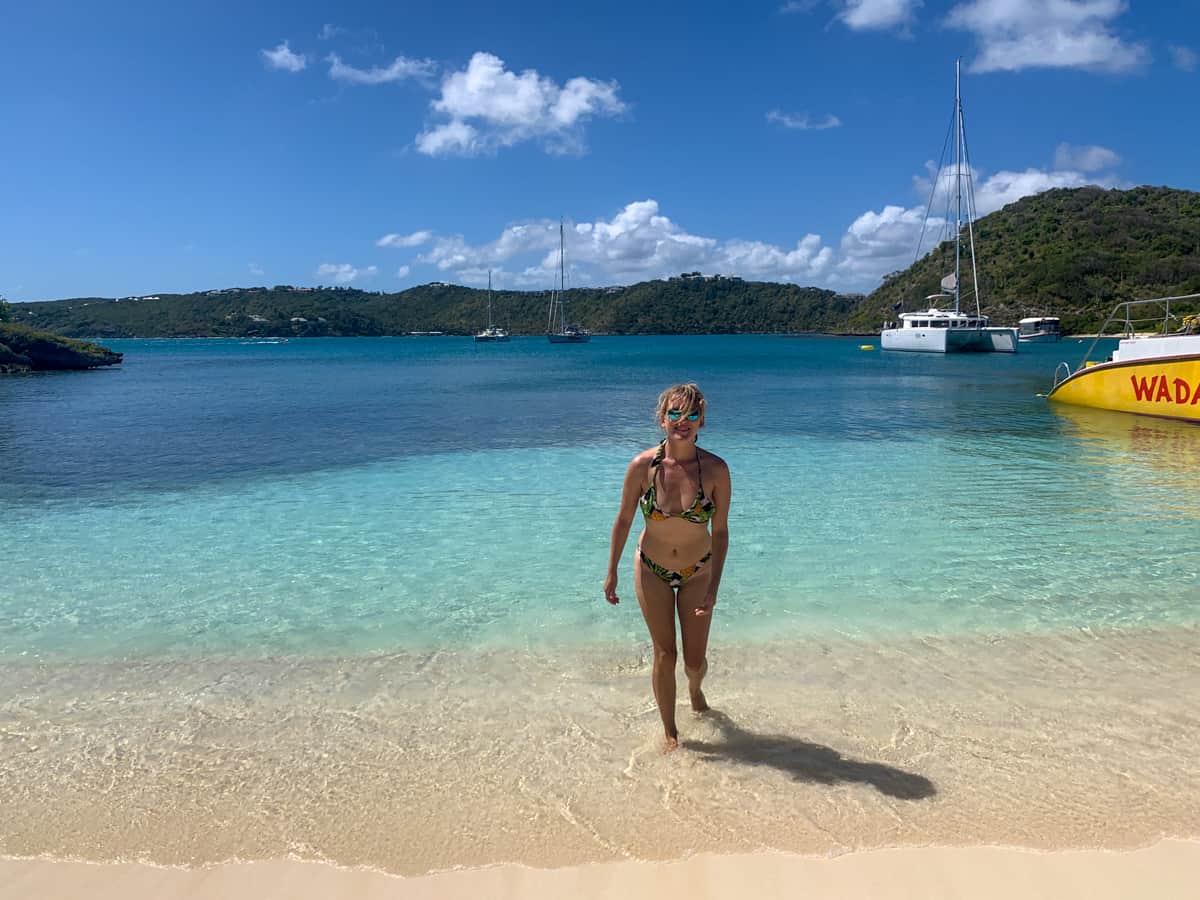
The Antigua Nomad Digital Residence allows you to live and work in Antigua and Barbuda for up to two years.
Antigua is a beautiful island with a beach for every day of the year! I spent a few weeks traveling and working remotely in Antigua and had a great time. I found it easy to make friends here. There’s already a pretty established expat scene here due to all the yachties that come here to live and work, especially in English Harbour.
Requirements: Must be employed or self-employed while paying income taxes to your place of residence or native country. Earn at least 50,000 USD a year or show that you can support yourself as well as any family members joining. Must maintain health insurance throughout your stay.
Application Fee: 1,500 USD for singles, 2,000 USD for couples, and 3,000 USD for families (3+ people).
COVID-19 Entry requirements: Antigua & Barbuda is open for international tourism. You must take a PCR test within 7 days of arrival, and stay at a COVID approved accommodation. You can find the latest requirements here.
At Home in Curaçao
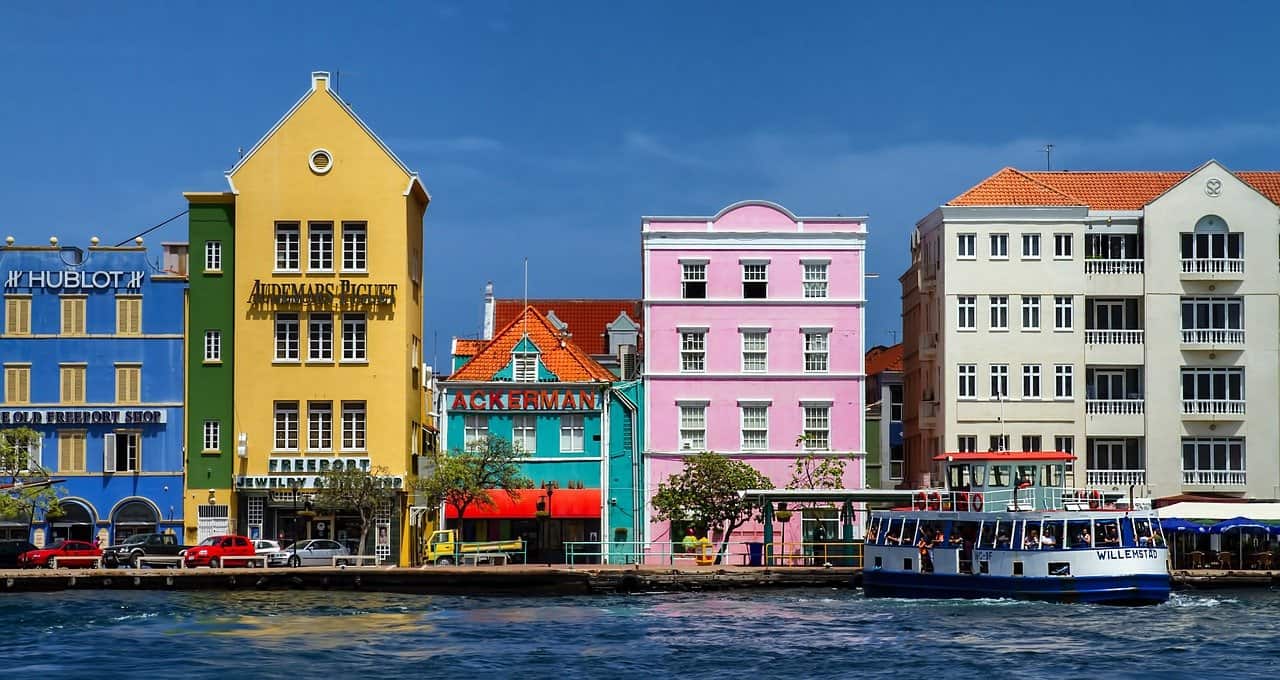
The gorgeous island of Curaçao has started the At Home in Curaçao program which allows extended stays for remote workers up to six months with the possibility of extending another six.
Application requirements: Proof of solvency (no mention of specific salary required) and insurance that covers COVID-19.
Application fee: 294 USD
Application process: Apply online here with the required documents listed on the website. Should get a decision within 14 days.
COVID-19 Entry Requirements: There are different protocols for low-risk and high-risk travelers which are listed on the website here. If you are coming from a high-risk country you will need to show a negative PCR test taken with 72 hours of arrival and complete the digital immigration card online here.
Cayman Islands Global Citizen Concierge Program
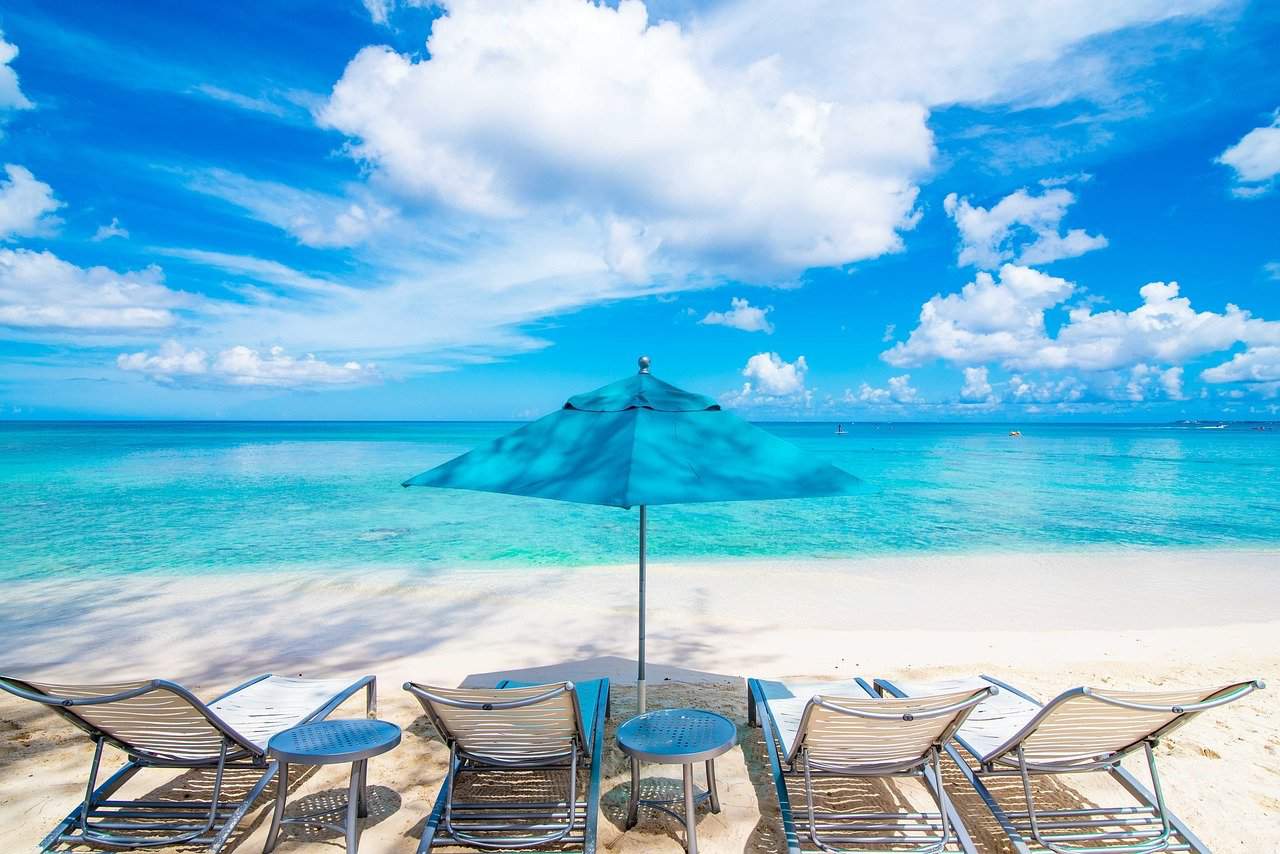
The Cayman Islands Global Citizen Concierge Program allows travelers to work remotely from the Cayman Islands for up to 24 months. The Cayman Islands are a British Overseas Territory in the western Caribbean Sea known for its stunning beaches and varied snorkeling sites.
Application requirements: Must be employed outside of the Cayman Islands and make at least 100,000 USD a year for singles. Couples must earn a combined minimum of 150,0000 USD, and families with one or more children must make at least 180,000 USD a year.
Application fee: 1,469 USD per annum for two adults, 500 USD per additional dependent.
Application process: You can apply online here. Several documents are required for the application process which are listed on the website.
COVID-19 Entry Requirements: All arriving travelers aged 10 years or older must present a PCR test taken within 72 hours of arrival. Travelers must remain in quarantine for a minimum of 14 days, and take a COVID-19 test on day 15. Travelers must await the Day 15 test result and then if the test is negative, complete the off-boarding process. See the latest travel updates here.
Monserratt Remote Workers Program
The Monserratt Remote Workers Program allows remote workers to live and work in Monserrat for up to 1 year. Monserrat is a volcanic island with incredible hiking trails, making it a perfect choice for those who love adventure travel.
Application requirements: Must earn an annual income of 70,000 USD and have health insurance that includes COVID-19 coverage.
Application fee: 500 USD for singles, 750 USD for families (up to 3, additional dependents are 250 each)
How to apply: Apply online here, decision is made within 7 days.
COVID-19 Entry Requirements: Monserrat is currently not allowing short-term tourists (only those with the remote work stamp). A negative COVID-19 test must taken within 5 days of arrival and there is a mandatory 14 day quarantine.
Anguilla Remote Work Visa
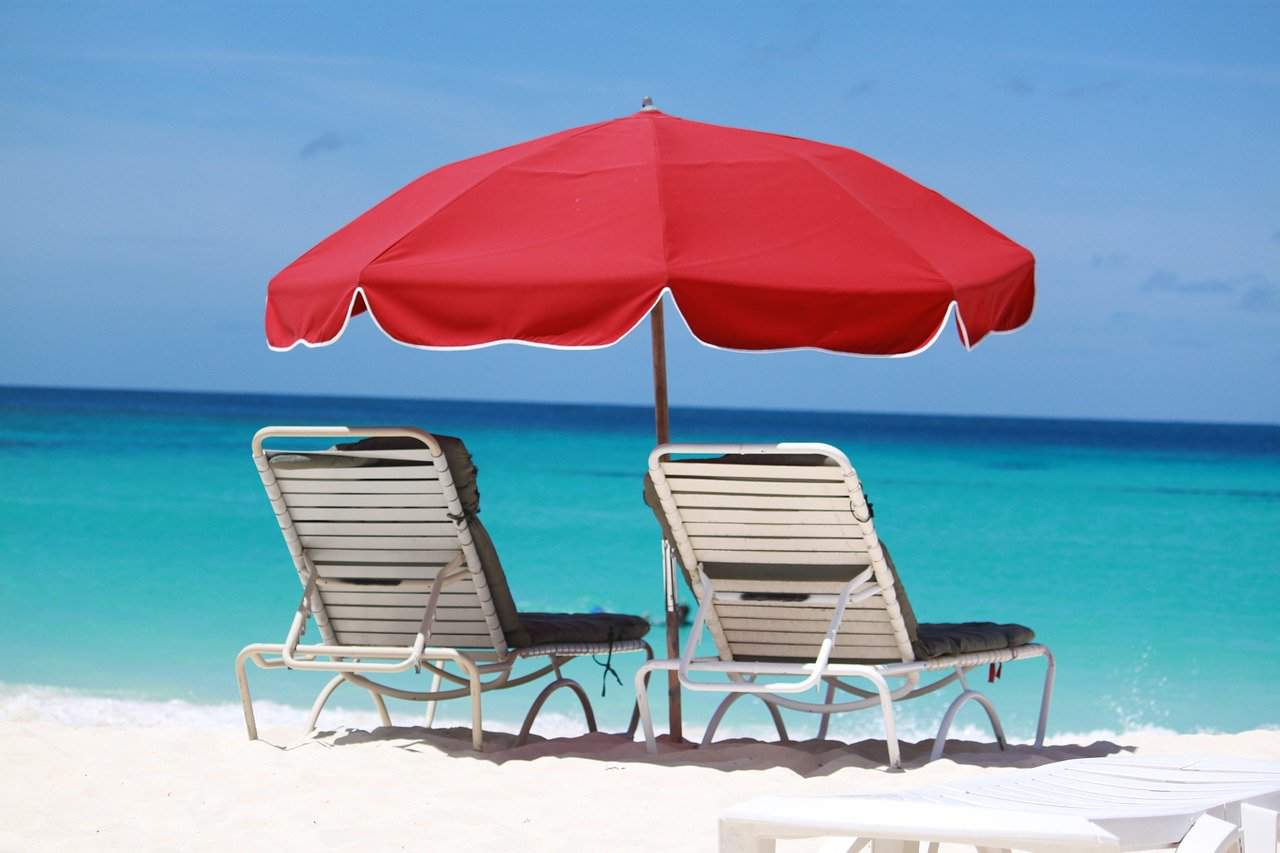
Anguilla is offering a remote work visa that allows you to live and work there for up to 12 months. Not only is Anguilla known for it’s stunning beaches and coral reefs, but it’s one of the safest places in the world to be with only with only 3 confirmed cases since the start of the pandemic.
Requirements: Employed outside of Anguilla (no mention of specific salary needed).
Application process: Apply online here with required documents, should hear back within 14 days.
Application fee: 2,000 USD Singles, 3,000 USD for families (up to 4, 250 USD per additional dependent).
COVID-19 Entry Requirements: You must apply online to go, even as a reguar tourist. Once approved to go, you must submit a negative PCR test results 3-5 days before arrival. Upon arrival, you will be tested again and a follow-up test will also be performed after 8 days.
Aruba work staycation
Aruba is offering a ‘One Happy Workcation‘ program for US Citizens, allowing remote workers to stay on the island for up to 90 days. Aruba is only a 20-mile-long island, but it packs a lot in. Picture your office breaks swimming in turquoise seas.
Application requirements: You have to be employed by a company or be self-employed in your home country. You are not allowed to render services to and receive income from an Aruban company.
Application process/fee: None, you just book one of the packaged deals on the website for at least one week.
COVID-19 Entry Requirements: All travelers must have a negative Molecular COVID-19 test before arrival, submit a personal health assessment, and purchase Aruba Visitors Insurance. If you do not have a test, you will be given one on arrival and put in mandatory quarantine at a hotel while waiting for your results.
Work from Berbuda certificate
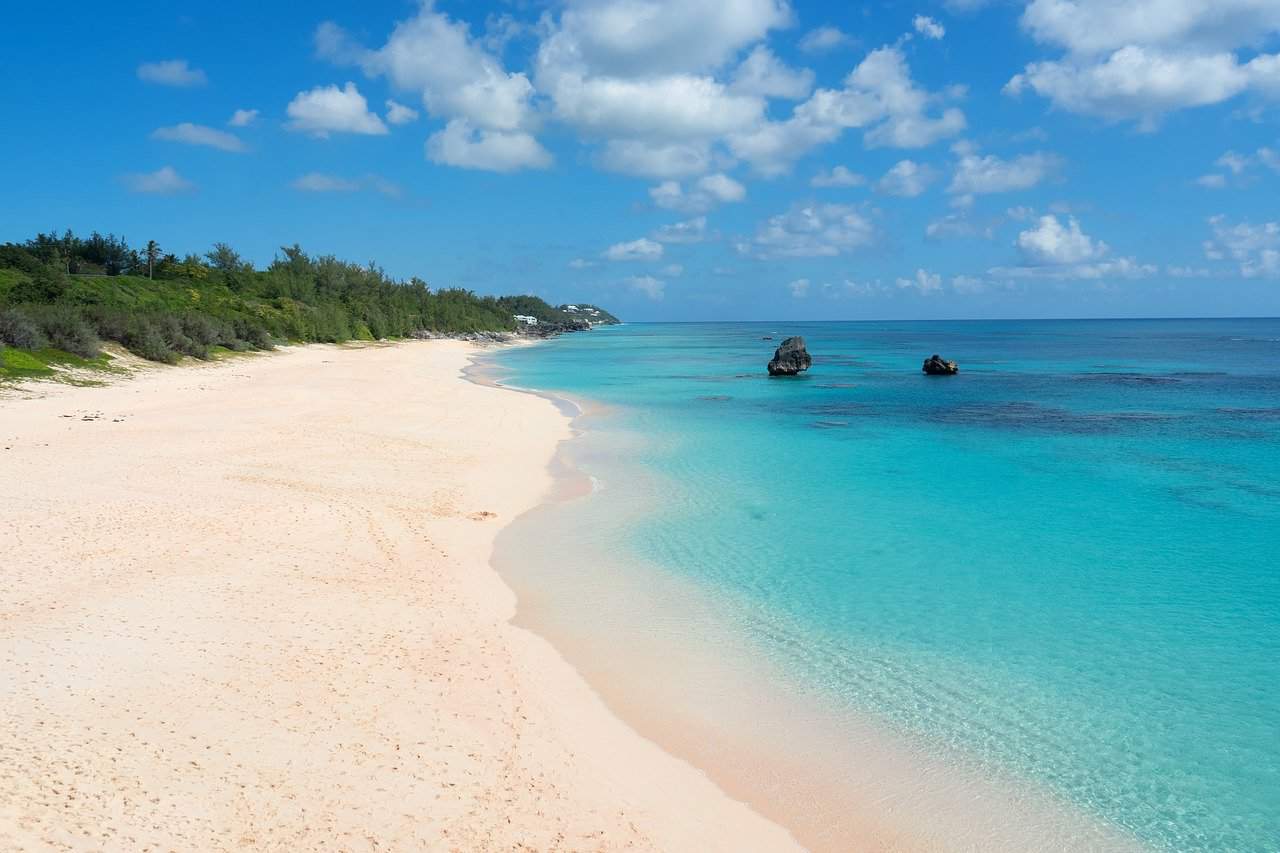
I know, I know, Bermuda is not technically in the Caribbean. But it’s getting a mention anyways since it’s another island paradise. Just a two-hour hop away from New York City, with some of the best diving and beaches in the world.
Application requirements: Be employed by a company or self-employed overseas; be a student who can provide evidence of enrollment in a research, undergraduate, graduate or doctorate program; or be able to demonstrate sufficient means of getting by without needing to be employed in Bermuda.
Application process: Complete the application form online here, you should get a response within 5 days.
The Work from Bermuda Certificate allows remote workers to live and work on the island for up to one year.
Application fee: 263 USD
COVID-19 Entry Requirements: Visitors must provide proof of a valid negative COVID-19 PCR test taken no more than 5 days before arrival. All residents and visitors to Bermuda are required to wear a traveler wristband for the first 14 days of their stay.
What to do if you don’t earn enough for the programs
If you don’t earn enough money to meet these program requirements, or don’t want to pay the application fees, then you can still go and live and work from home in the Caribbean for a shorter period of time on a regular tourist visa.
This is exactly what I am doing. As a Canadian (or American), most of these Caribbean islands offer 3-month tourist visas on arrival, sometimes up to 6. So I stay on one island for a couple of months and then hop on to the next one. It’s a pretty great way to live!
—
If you’re ever dreamt of working from home in the Caribbean, now is the perfect time to give it a try. And with remote work on the rise, it won’t be surprising to see more countries offering digital nomad visas in the future. Tell me in the comments below which country you would love to move to!
Enjoyed this post? Pin it for later!
